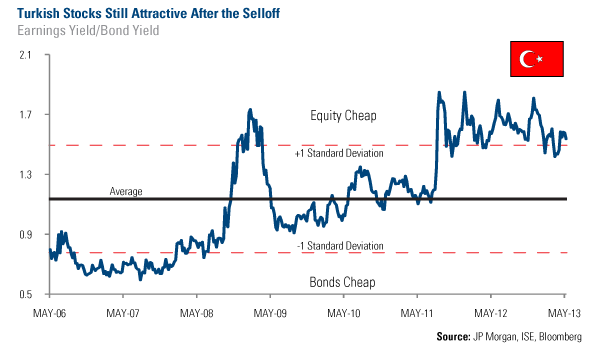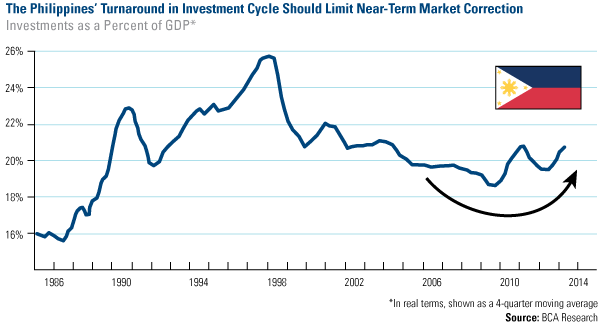Emerging Markets Radar (June 10, 2013)
Strengths
- The Peruvian Finance Minister Castilla, speaking in congress, reiterated the country will grow at the forecast rate of 6.3 percent during 2013. Later the same day, the Central Bank Governor Velarde suggested economic growth in April likely reached 7.4 percent and GDP growth for the second quarter of the year could reach 6.4 percent. The news came as first-quarter growth disappointed at 4.8 percent compared to analyst estimates of a 5.9 percent rise. Despite the disappointment, the country remains the only major Latin American economy growing at a pace greater than 4 percent.
- The Hungarian market posted a 4.31 percent rise for the week, significantly outpacing its emerging market peers as positive macroeconomic indicators were released and encouraging statements on the central bank’s growth program were released. According to Bank Director Marton Nagy, the Funding for Growth Program will add as much as 50 basis points to GDP through 2014 as the bank targets easing credit to selected selectors. In addition, industrial production surprised to the upside at 2.9 percent, compared to 1.4 percent forecast by analysts. The data underscores the government’s prediction of an economic turnaround as the country fights its way out of a second recession since 2008.
- China’s official Purchasing Managers’ Index (PMI) rose to a higher-than-expected 50.8 in May from 50.6 in April, signaling still resilient overall manufacturing activity given its broad survey sample of 3,000 companies across 21 industries.
- South Korea’s export growth in May reaccelerated to an above-consensus 3.2 percent year-over-year and 3.9 percent month-over-month, despite persistent weakness of the Japanese yen, as strength in technology exports more than offset the weakness in auto.
- Taiwan’s exports rose 0.9 percent year-over-year in May versus an expected shrinkage, thanks to stronger shipments of technology products such as smartphones and tablet PCs. Trade balance expanded to $4.46 billion.
Weaknesses
- Standard & Poor’s cut its outlook on Brazil’s sovereign credit rating from stable to negative on the country’s BBB rating. The rating agency cited sluggish economic growth and an expansionary fiscal policy which could lead to an increase in the government’s debt load. The move follows a recent government lowering of its economic growth expectations from 3 percent to 2.77 percent for 2013, and a 50 basis point rise in interest rates by the central bank, adducing a necessity to curb rising inflation. The move threatens to reverse the pace of rating upgrades received by many Latin American nations in the prior decade.
- Russian inflation accelerated for a second month in a row and at the fastest pace since 2011. The official consumer price index measure rose 7.4 percent in May from a year ago, beating analyst estimates of a 7.3 percent rise, and more than 100 basis points above the 6 percent cap of the central bank’s target range. The increase is mainly attributed to higher food prices. The new measure continues to limit the ability of the central bank to ease monetary conditions which forces private banks to absorb the effect by accepting lower net interest margins, as they are pressured by President Vladimir Putin to lead the necessary credit expansion.
- Thailand recorded another $558 million net fund outflows this week, the highest weekly outflow in the past 20 months, as investors worried about macro overheating risks continued to take profits after sizable gains in the market.
- Indonesia also registered net fund outflows of $395 million this week, as a near-term correction in Southeast Asia, led by Thailand and the Philippines, dampened investor sentiment, as did to weak leading indicators of Chinese demand.
- Singapore’s loan growth momentum slowed in April to 0.7 percent month-over-month from a 6.2 percent pace in the first quarter, with the slowdown most evident in manufacturing. The overall loan-to-deposit ratio rose to 99 percent, a record high since 1999.
Opportunities
- The Brazilian Minister of Finance announced earlier this week the elimination of the tax levy previously imposed on fixed-income products purchased by foreigners. Traditionally, foreigners were charged a 6 percent levy on money brought into the country for purchases of fixed-income securities. The abolishment of the levy should have a positive effect on the trading volume of the Bovespa and the foreign trading of derivatives in the country.
- Although the political instability in Turkey will add near-term volatility, we believe it is highly unlikely to pose a threat to the market in the long run. Much talk on the protests in the country has been analyzed from an “Arab Spring” perspective, a flawed analysis in our opinion. We believe these protests resemble the Russian protests ahead of Putin’s reelection last year, which leads to the conclusion that the current situation in Turkey is not meant to last. In these two cases, the protests were about the suppression of political freedom, rather than the mass protests against authoritarian states whose citizens are poverty stricken and prepared to unleash serious violence, for they really have nothing to lose. In the case of Turkey, the protesters are relatively prosperous members of the middle class with jobs and rising purchasing power. As such, the fundamental valuation metrics have not changed and Turkish equities appear to be undervalued at current levels, extending a new opportunity to add exposure to the country.
- The recent sell-off in the Philippines’ market belies the ongoing structurally positive investment cycle in the country. Real investment has grown on a sequential basis for five consecutive quarters, largely driven by construction, taking a rising share of GDP. Secular growth potential remains unchanged for the financials as well as the consumer sector.
Threats
- Investors are losing faith in Mexican President Pena Nieto’s ability to revamp the domestic oil sector and have his proposed energy bill passed by congress. Pemex, the state-owned oil company, is struggling to maintain its output capacity as it meets high payout requests from the government. The proposed bill aims to address the unreasonable tax burden faced by the company, which paid 55 percent in taxes in 2012, and exudes the lowest margin of any oil company with at least $100 billion in revenue, as well as to allow for profit sharing contracts between Pemex and private companies who can advance on the exploration and development of new fields.
- Days of torrential rain led to the worst flooding in at least a decade in Prague and other areas of the Czech Republic over last weekend, threatening to flood the city’s historic districts and crops grown on the banks of the Vltava River. The repairs may total as much as $1.78 billion which may cause a further 0.7 percent decrease in GDP growth for 2013 in an economy whose GDP has dropped for six quarters in a row and remains in the longest recession in the country's history. Ironically, the floods may prove beneficial in the long run as the country may be eligible to receive significant funding from the EU Solidarity Fund for flood relief.
- Weak seasonality in Chinese manufacturing activity in the coming summer months, coupled with lack of material government policy action, may weigh on the investor psyche and reintroduce volatility to the market.












